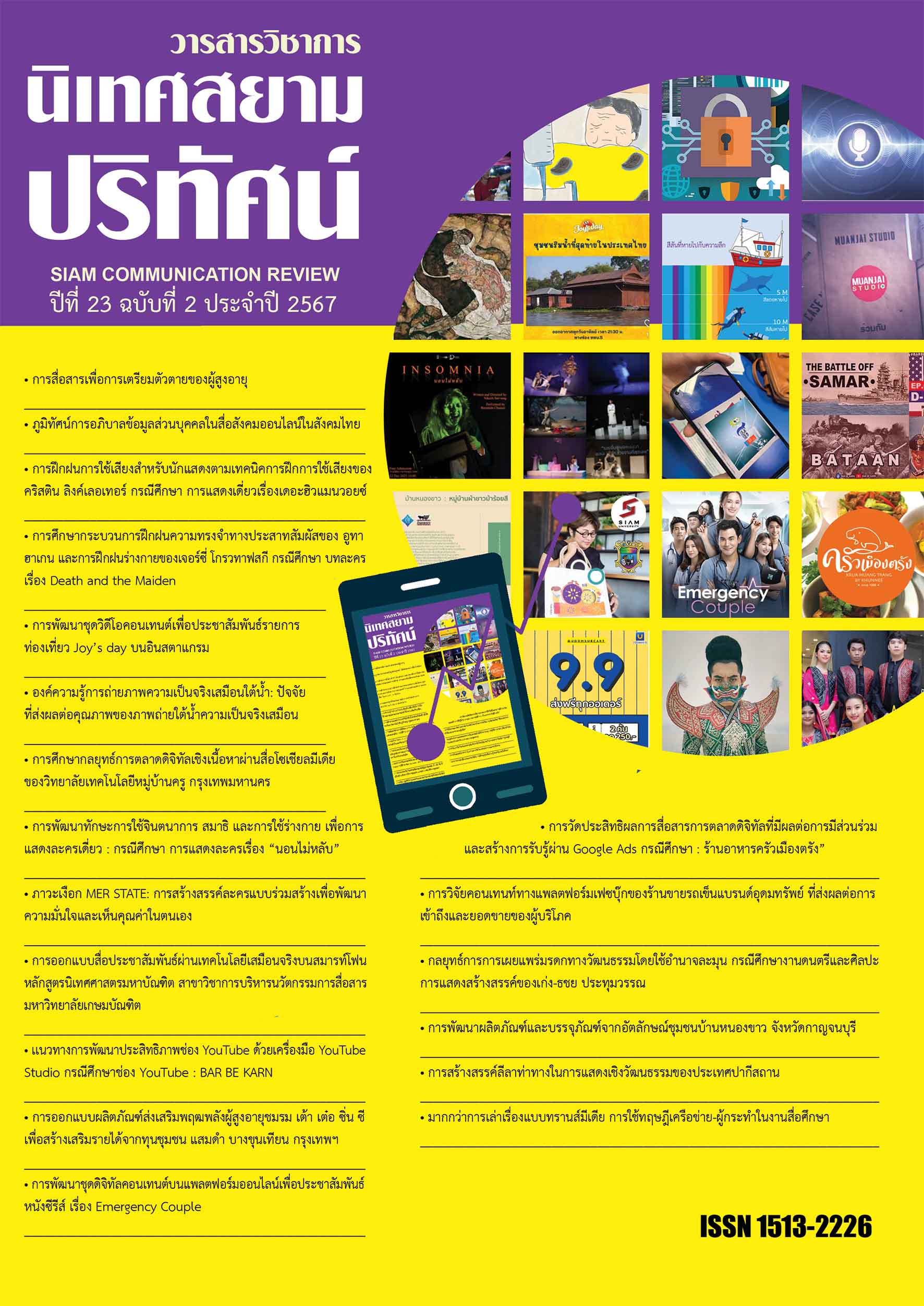The Landscape of Data Privacy Governance of Social Media in Thailand
Main Article Content
Abstract
This qualitative research aims to describe the landscape of personal data governance in social media. Using Lessig's (2006) internet regulatory framework that discusses four mechanisms: technological codes, markets, laws, and social norms. To explore the roles and responsibilities of various sectors that use these mechanisms, namely the media technology sector, the market sector, the government sector, and civil society and the public. The research method is analysis of related documents in the fields of information technology, law, online media, online marketing communication with related electronic documents, such as privacy policies or data policies of social media and marketing companies.
The research results found that for more than 2 decades of development of the governance of personal data in social media, there have been three eras of dynamic changes from 2000-2023: 1. Governance as Social Media (2000-2006). Social media technology is primarily related to the public sector as a communication channel. User information is stored. But it has not yet been given to a third party. Social media can fully develop their technology to collect and use data without government oversight. 2. Governance as Social Commerce Platform (2007-2017) Social media has developed into a platform for advertising. which has a business model that uses collected user data to generate income and has been highly successful. Data governance mode is self-regulation according to the self-regulation guidelines of the advertising industry. 3. Governance as Social Institution (2018-2023) Social media is an established business organization which has a great influence on society. Facing the huge problem of privacy violations, the government developed the data protection law such as the GDPR of European Union that affect the enactment of Thailand's PDPA law.
Article Details

This work is licensed under a Creative Commons Attribution-NonCommercial-NoDerivatives 4.0 International License.
References
ภาษาไทย
กระทรวงดิจิทัลเพื่อเศรษฐกิจและสังคม. (2562). กฎหมายคุ้มครองข้อมูลส่วนบุคคล. https://www.mdes.go.th/mission/detail/2319-กฎหมายคุ้มครองข้อมูลส่วนบุคคล.
เคอร์บาลิจา, โจวาน. (2558). เปิดประตูสู่การอภิบาลอินเทอร์เน็ต. พิภพ อุดมอิทธิพงศ์, แปล. กรุงเทพมหานคร: มูลนิธิเพื่ออินเทอร์เน็ตและวัฒนธรรมพลเมือง. https://apps.bangkok.go.th/info_gidsedbkk/bmainfo/data_DDS/document/Introduction-to-Internet-Governance.pdf
นคร เสรีรักษ์.(2557). ความเป็นส่วนตัว: ความคิด ความรู้ ความจริงและพัฒนาการเรื่องการคุ้มครองข้อมูลส่วนบุคคลในประเทศไทย. กรุงเทพฯ. สำนักพิมพ์ฟ้าฮ่าม.
พระราชบัญญัติคุ้มครองข้อมูลส่วนบุคคล พ.ศ.2562. (24 พฤษภาคม 2562) ราชกิจจานุเบกษา. เล่ม 136 ตอนที่ 69 หน้า 52-95.
พิรงรอง รามสูต. (2556). การกำกับดูแลเนื้อหาอินเทอร์เน็ต. กรุงเทพฯ. ศูนย์ศึกษานโยบายสื่อ คณะนิเทศศาสตร์ จุฬาลงกรณ์มหาวิทยาลัย.
พิรงรอง รามสูต. (2561). “สิทธิส่วนบุคคลในโลกออนไลน์” ไม่ใช่เรื่องไกลตัว https://www.chula.ac.th/cuinside/7484/
ราชบัณฑิตยสภา.(2556). อภิบาล. http://www.royin.go.th/?knowledges=อภิบาล-๑๓-มกราคม-๒๕๕๖
โอภาส เอี่ยมสิริวงศ์. (2561). วิทยาการคอมพิวเตอร์และเทคโนโลยีสารสนเทศ. กรุงเทพฯ. ซีเอ็ดยูเคชั่น.
Ad addict. (2023). สรุป 12 สถิติ Thailand Digital Spending 2023 ข้อมูลที่น่าสนใจในโลกแห่งการตลาดดิจิทัล จากสมาคมโฆษณาดิจิทัลแห่งประเทศไทย. https://adaddictth.com/News/thailand-digital-spending-2023.
Dama. (n.d.). สมาคมดาต้า เมเนจเม้นต์ (ประเทศไทย-กรุงเทพ) – DATA MANAGEMENT ASSOCIATION (THAILAND-BANGKOK). https://damathailand.org/.
DAAT. (2020). Digital Advertising Spend Mid-Year 2020. https://static-daat-prod.s3.amazonaws.com/200908-DAAT-Mid-Year-2020-Press-Report.pdf
Tok. Wiki. (n.d.). เฟสบุ๊ค เนื้อหาและประวัติศาสตร์. https://hmong.in.th/wiki/Facebook.
ภาษาอังกฤษ
Applied Social Media Lab at Harvard University. (n.d.). Applied Social Media Lab at Harvard University. https://asml.cyber.harvard.edu/.
Bennett, Colin and Raab, Charles D. (2018) Revisiting 'The Governance of Privacy': Contemporary Policy Instruments in Global Perspective. https://ssrn.com/abstract=2972086 or http://dx.doi.org/10.2139/ssrn.2972086
Bickert, Monika. (2020). Charting a way forward online content regulation. https://about.fb.com/wp-content/uploads/2020/02/Charting-A-Way-Forward_Online-Content-Regulation-White-Paper-1.pdf.
Cloud Privacy Checking. (2018). A brief history of data protection: how did it all start? https://cloudprivacycheck.eu/latest-news/article/a-brief-history-of-data-protection-how-did-it-all-start/.
Creech, Kenneth. (2000). Electronic media law and regulation. USA. Focal Press. P241-267.
Dahl, Stephan. (2015). Social media marketing: Theories and applications. London. Sage Publications.
Ehly, Justin. (2010). Social Media Business Models. https://www.slideshare.net/jcancu/social-media-business-models.
Epic.org. (2018). Facebook privacy. https://epic.org/privacy/facebook/.
Ess, Charles. (2014). Digital media ethics. UK. Polity Press.
Fiegerman, S. (2018, December 19). Facebook could be in hot water with the FTC — again. CNN; CNN. https://edition.cnn.com/2018/12/19/tech/facebook-ftc-consent-decree/index.html.
Fuchs, Christian. (2017). Social Media: a critical introduction. USA. Sage. P156-200
GDPR EU. (2018). Timeline. https://www.gdpreu.org/the-regulation/timeline/.
Genelle I. Belmas, Jason M. Shepard, Wayne E. (2019). Overbeck. Major principles of Media law, 2019 edition. USA. Cengage. P187-207.
Ginosar, Avshalom. (2018). Governance, Public interest, and Public Film Funding: An Integrative Theoretical Framework. https://link.springer.com/content/pdf/10.1007%2F978-3-319-71716-6_6.pdf.
Google. Personalized and non-personalized ads - AdSense Help. (n.d.). Support.google.com. https://support.google.com/adsense/answer/9007336?hl=en.
Home. (n.d.). DAMA. https://dama.org/.
JSW - Sustainability-Framework-Measuring-Success- Business Ethics. (n.d.). JSW. https://www.jsw.in/groups/sustainability-framework-measuring-success-business-ethics.
Kuner, Christopher. (2003). European data Privacy Law and Online Business. New York. Oxford University Press.
Latham, Robert. (2006). View of knowledge and governance in the digital age: The politics of monitoring planetary life. https://firstmonday.org/ojs/index.php/fm/article/view/1398/1316.
Lessig, Lawrence. (2006). Code: Version 2.0. https://cyber.harvard.edu/ptc2010/sites/ptc2010/images/Lessig_Code_Excerpts.pdf
Martin, Kelly D. Murphy, Patrick E. (2017). The role of data privacy in marketing. DOI 10.1007/s11747-016-0495-4.
Mcstay, Andrew. (2017). Privacy and the media. USA. (P77-80). Sage.
Murwa, Violet, et., al. (2018). Enhancing & disseminating Africa’s scholarly publications the effect of the EU general data protection law on big data: a literature review. https://www.researchgate.net/publication/323244997.
New Hampshire PBS. (2024, May 15). Social Media & Democracy with Lawrence Lessig. YouTube. https://www.youtube.com/watch?v=RZrfVDybVWg.
Packard, Ashley. (2010). Digital media law. UK. Blackwell Publishing.
Patel, N. (2023, October 24). Harvard professor Lawrence Lessig on why AI and social media are causing a free speech crisis for the internet. The Verge. https://www.theverge.com/23929233/lawrence-lessig-free-speech-first-amendment-ai-content-moderation-decoder-interview.
Susan B. Barnes. (2006). A privacy paradox: Social networking in the United States by First Monday, volume 11, number 9, http://firstmonday.org/issues/issue11_9/barnes/index.html.
Tech companies need to change. (n.d.). Security Pledge. https://www.securitypledge.com/#pledge.
Techworld. (2018). The most infamous data breaches. https://www.techworld.com/security/uks-most-infamous-data-breaches-3604586/.


